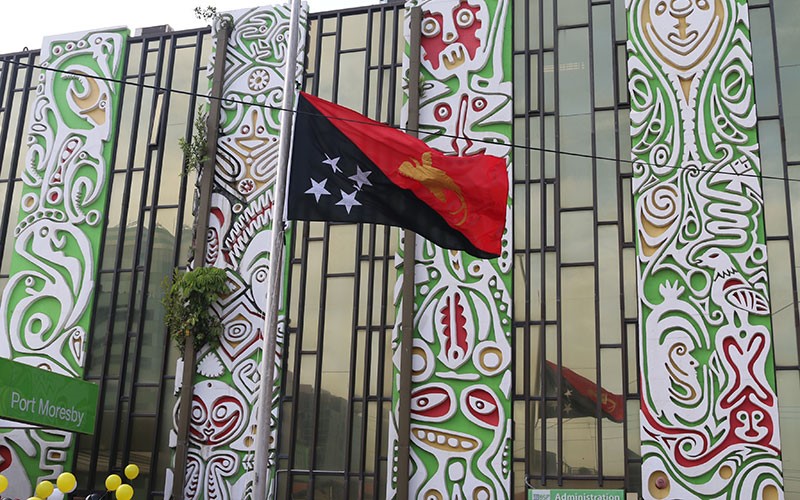Bank South Pacific says it is considering its legal options after the Bank of Papua New Guinea formally cautioned it over what the central bank believes is “contrary conduct under the anti money laundering/counter terrorist financing act.”
In issuing the formal warning yesterday, the Bank of PNG called for BSP Financial Group to remove executive management staff and to appoint an external auditor, reports Loop PNG.
However in a statement to the Australian Securities Exchange today, BSP Financial Group says “it remains of the view that it has at all times complied with its AML/CTF obligations.”
It also notes that no financial penalties have been imposed, and there has been no determination to start criminal proceedings against the group.
Yesterday the regulator’s Financial Analysis and Supervision Unit (FASU) said BSP has failed to identify legitimate sources or reasons for several million Kina in payments by one customer to another customer who is a politically-exposed person.
On 17 June 2020, BSP was issued a ‘show cause’ notice requiring it to explain why FASU should not impose enforcement actions. After granting two consecutive extensions of time to respond, FASU received BSP’s response to that notice on 6 April 2021.
“FASU has done all it can to ensure BSP has been afforded natural justice in this very serious matter during these difficult times. FASU has granted BSP additional time to respond on two consecutive occasions and, while FASU would have preferred this matter be resolved earlier, it is appreciated that procedural-fairness and due-process require that BSP was/is given sufficient time to review and consider the findings fully and obtain legal advice,” stated BPNG.
FASU has now:
- issued BSP with a formal warning under Section 100 of the AML/CTF Act 2015. The nature of BSP’s non-compliance is serious enough for FASU to have issued an Infringement Notice, however, FASU has chosen to apply a formal warning instead, making this the first occasion of regulatory action undertaken by FASU against BSP. Consistent with the application of section 100 of the Act, FASU believes that there are reasonable grounds to determine that BSP has engaged in conduct that contravened requirements of the Act.
- is seeking from BSP an enforceable undertaking that it will remove and replace certain executive management staff pursuant to Section 102 of the Act.
- requires BSP to engage an external auditor pursuant to section 10 of the Act. The engagement of an external auditor is deemed necessary to determine the full extent of the underlying good governance and best business practise issues that were identified during the onsite inspection. The external auditor’s examination will cover ECDD practises employed by BSP on all of the high risk and Politically Exposed Persons (PEPs) who are customers of BSP.
During the onsite inspection FASU obtained detailed and compelling evidence of these contraventions, based on BSP’s failure to:
- Identify legitimate sources or reasons for several million Kina in payments by one customer to another customer who is a PEP;
- Conduct any form of ECDD on a customer who was the subject of money laundering charges related to transactions conducted through BSP bank accounts;
- Conduct any form of ECDD on a customer who has credible allegations of money laundering made against them in international media;
- Conduct an examination of Suspicious Matter Reports (issued by BSP) as part of the ECDD process;
- Obtain documentation, or maintain records, in a manner required by the AML/CTF Act.
These regulatory measures seek to address the systemic culture of non-compliance within BSP in the least punitive manners possible and are deemed necessary to protecting the integrity of PNC’s financial system.
Loop PNG reports that BSP’s response contained a blanket denial of any offences at all, and contained no acknowledgement of the deficiencies that led to the offending. This response provided no indication or evidence that FASU had erred in its interpretation of the evidence obtained during the onsite inspection, or that there were mitigating factors that needed to be considered. The manner in which BSP has responded has also forced FASU to confront the reality that the issues identified during the Onsite Inspection are systemic.
BSP listed on the Australian Stock Exchange in May and the Australian Financial Review is reporting that the Bank of PNG warning is putting pressure on the Commonwealth Bank of Australia and National Australia Bank to cut ties with BSP. The newspaper reports that the Bank of PNG’s call for the removal of executive staff is said to include Chief Executive, Robin Fleming.
CBA and NAB provide correspondent banking services to BSP in Australia, providing a gateway for BSP’s clients from across the Pacific to transfer money in and out of Australia.
BSP operates in PNG, Fiji, the Solomon Islands, Tonga, Samoa and the Cook Islands.
*This story has been updated to include BSP’s response to the Australian Securities Exchange.

One Comment “ANZ expects Fiji’s “high” liquidity to ease from next year”
Comments are closed.